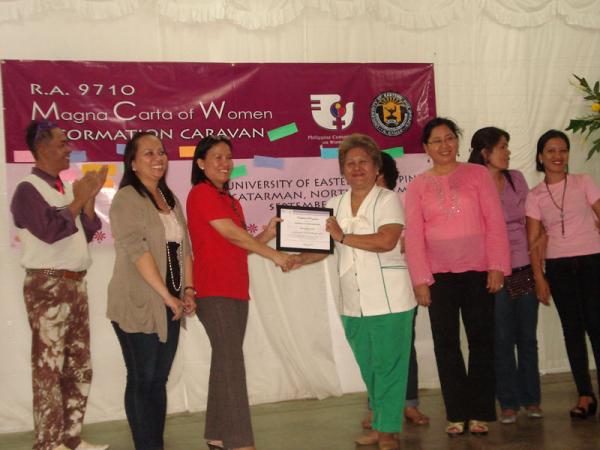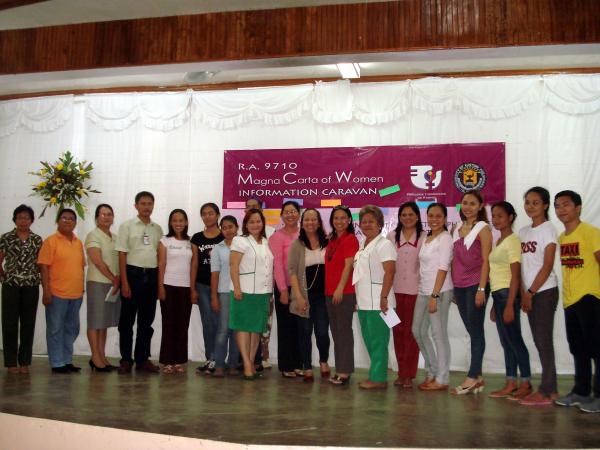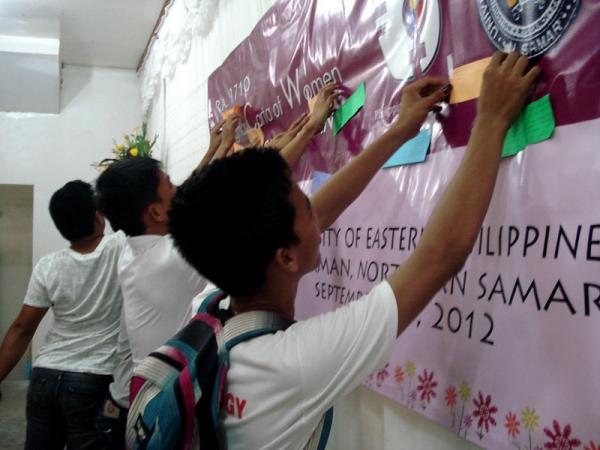PCW and UEP collaborate for gender-responsive public higher education in Northern Samar

Recognizing the Academe’s pivotal role in shaping the minds of future leaders, the Philippine Commission on Women (PCW) partnered with the University of Eastern Philippines (UEP) in Catarman, Northern Samar to educate school officials, faculty, non-teaching personnel, and students on the Magna Carta of Women (MCW, R.A 9710) on September 18.
The PCW, the lead agency for women’s empowerment and gender equality, with funding support from the Office of Senator S. Pia Cayetano, embarked on an information caravan to disseminate and drum up support for the implementation of the law.

Officers from the Philippine Commission on Women (PCW) and the University of Eastern Philippines (UEP) join the faculty, non-teaching staff and student leaders from the universities and schools in Northern Samar who promised to do their share in implementing the Magna Carta of Women (MCW, RA 9710). The MCW Information Caravan was held at the UEP on September 18, 2012. 
Male student leaders from several universities and colleges in Northern Samar post their pledges of support to refrain from using gender-biased language in school and in their homes.
The MCW Information Caravan held at the UEP seeks to help make Northern Samar’s education landscape become responsive to the needs and concerns of women and men.
Ms. Anette E. Baleda, Officer-in-Charge of PCW-Information Resource Management Division discussed the provisions of the MCW with emphasis on Section 13 (Equal Access and Elimination of Discrimination in Education, Scholarships, and Training). The section calls for the revision of gender stereotypes and images in educational materials and curricula, use of gender-sensitive language, increase in the enrolment of women in non-traditional skills training, and outlawing the expulsion and non-readmission of women faculty and students due to pregnancy outside of marriage.
Expounding on the MCW provisions on women’s rights to protection from violence, Ms. Nharleen Santos-Millar, Chief of PCW-Policy Development and Advocacy Division discussed the Anti-Sexual Harassment Act of 1995 (RA 7877), Anti-Trafficking in Persons Act of 2003 (RA 9208), Anti-Rape Law of 1997 (RA 8353), Anti-Violence Against Women and Their Children Act of 2004 (RA 9262). “It is important for teachers and students to be familiar with the laws so you can help address VAW issues,” Millar said.
One of the “hottest” questions raised is about the “immoral behavior” of unwed but pregnant women educators and students. “Schools should provide support to unmarried students and faculty who got pregnant,” Baleda said. She also specified that the MCW is a national policy that applies to all and, thus, should “prevail over school policies.” Ms. Franz Monique C. Viray, PCW Information Officer, added that the MCW does not contend with immorality issues but upholds women’s right to education and practice of profession among others, and promotes responsibility in sexual relations. Viray also said that the expulsion and non-readmission of unmarried pregnant teachers and students are discriminatory because the women are “burdened” with carrying a child while their male partners continue living a “normal” life.
UEP President Atty. Mar P. De Asis, through his message delivered by Vice President for Academic Affairs Dr. Felisa L. Sanico, said that the university commits to promote and uphold women’s rights as an “essential component of achieving our vision of transforming lives” and as “part of the roadmap in public higher education.”
Other commitments generated from officials, teachers, and student leaders from 10 universities and colleges in Northern Samar include incorporating relevant provisions in the MCW and other VAW-related laws in school subjects, making information, education and communication materials about gender, and adopting gender-friendly behavior and practices in their respective schools and their communities.
“UEP will provide leadership with the GAD Center already in place,” De Asis said adding that MCW compliance shall be “ensured in classrooms, workplace and anywhere and at all times.”
Millar said the PCW, as the monitoring body of the MCW, is set to follow up the commitments made and track the progress of Northern Samar universities and colleges.

